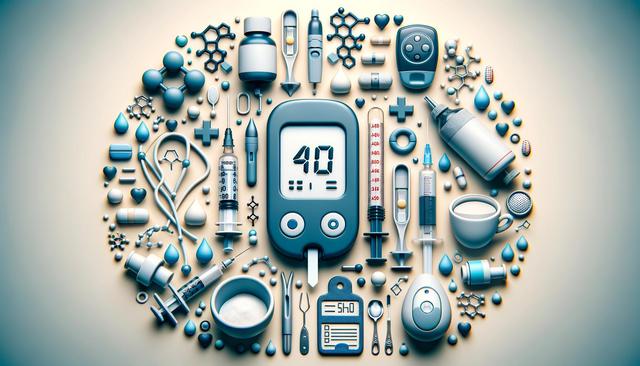What Are Blood Sugar Levels and Why Do They Matter?
Blood sugar levels, or blood glucose levels, refer to the amount of glucose present in the bloodstream. Glucose is a crucial energy source for the body and is derived from the foods we eat, especially carbohydrates. The body regulates glucose levels through insulin, a hormone produced by the pancreas. When this regulation system is disrupted, it can lead to conditions like pre-diabetes or diabetes.
Consistently high blood sugar levels can damage various organs and systems in the body, increasing the risk of heart disease, kidney problems, vision loss, and nerve damage. Monitoring and maintaining optimal blood sugar levels is important not only for those diagnosed with diabetes but also for individuals aiming to prevent it. Understanding how to support healthy blood sugar levels at home can empower people to take proactive steps in safeguarding their health.
Key symptoms of abnormal blood sugar levels include:
- Frequent urination
- Increased thirst
- Fatigue
- Blurred vision
- Slow healing of wounds
Recognizing these early signs is important for timely intervention and management.
Diet and Nutrition: Foundation of Blood Sugar Management
One of the most effective ways to maintain healthy blood sugar levels is through proper diet and nutrition. Consuming a balanced mix of whole foods, rich in fiber and low in processed sugars, can significantly help stabilize glucose levels. Fiber slows down the absorption of sugar, preventing spikes in blood glucose after meals.
Foods that support blood sugar balance include:
- Leafy greens and non-starchy vegetables
- Whole grains like oats and quinoa
- Legumes such as lentils and chickpeas
- Healthy fats from nuts, seeds, and avocados
- Proteins from lean meats, fish, or plant-based sources
Incorporating these foods into your daily meals can contribute to better glucose control. Additionally, staying hydrated and avoiding sugary drinks are simple yet effective strategies. For those exploring a more natural approach, certain natural supplements for pre-diabetes may provide added support when used alongside dietary improvements.
Physical Activity and Its Role in Glucose Regulation
Physical activity plays a significant role in managing blood sugar levels. Regular exercise helps the body use insulin more efficiently, which can lower blood glucose levels and improve energy use. Even moderate activity, such as walking or cycling, can have a positive impact.
Recommended activities for maintaining healthy blood sugar include:
- Brisk walking for 30 minutes daily
- Strength training exercises two to three times per week
- Yoga or stretching to reduce stress and promote flexibility
- Recreational activities like dancing or swimming
Consistency is key. It’s not necessary to engage in high-intensity workouts to see benefits. For individuals with mobility limitations or beginners, starting slow and gradually increasing intensity is advisable. Combining physical activity with other strategies on how to support healthy blood sugar levels at home can yield long-term benefits.
Natural Supplements and Herbal Support
In addition to lifestyle changes, some people explore the use of natural supplements for pre-diabetes as part of their management plan. These supplements often include plant-based ingredients traditionally used to support glucose metabolism and insulin sensitivity.
Common ingredients found in such supplements may include:
- Cinnamon extract: May help reduce insulin resistance
- Berberine: A plant compound known for its impact on glucose regulation
- Bitter melon: Traditionally used to help with blood sugar balance
- Alpha-lipoic acid: An antioxidant that supports nerve health and glucose uptake
- Chromium: A trace mineral that plays a role in carbohydrate metabolism
Before starting any supplement regimen, it’s essential to consult a healthcare provider, especially for individuals taking medication or managing other health conditions. Supplements should be seen as complementary tools, not replacements for a balanced diet and regular activity.
Home Strategies and Daily Habits for Better Blood Sugar Control
Learning how to support healthy blood sugar levels at home involves developing daily habits that promote overall well-being. Small, consistent actions can lead to significant improvements over time. Besides nutrition and exercise, other home-based strategies can be equally impactful.
Helpful practices to incorporate into daily life include:
- Monitoring blood sugar levels regularly (if recommended)
- Managing stress through mindfulness, meditation, or breathing techniques
- Getting sufficient sleep—at least 7 hours per night
- Avoiding smoking and limiting alcohol intake
- Maintaining a regular eating schedule to avoid blood sugar fluctuations
Creating a supportive environment at home, such as preparing healthy meals in advance or setting reminders for hydration and movement, can make managing blood sugar levels more manageable and sustainable.
Conclusion: Taking Charge of Your Blood Sugar Health
Understanding and managing blood sugar levels is an important step toward preventing chronic health issues and maintaining long-term vitality. By focusing on balanced nutrition, regular physical activity, and incorporating safe, natural approaches where appropriate, individuals can take meaningful action. Exploring natural supplements for pre-diabetes and learning how to support healthy blood sugar levels at home empowers individuals to be proactive in their health journey. Small daily choices truly add up, and with the right knowledge and support, better blood sugar balance is within reach.




Leave a Reply